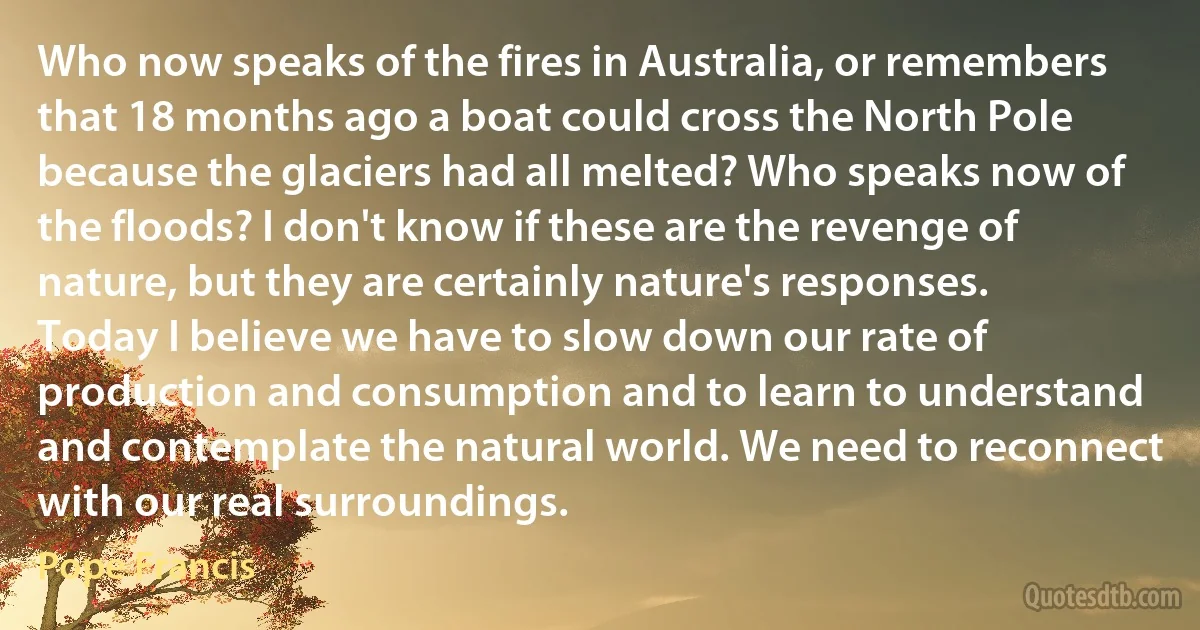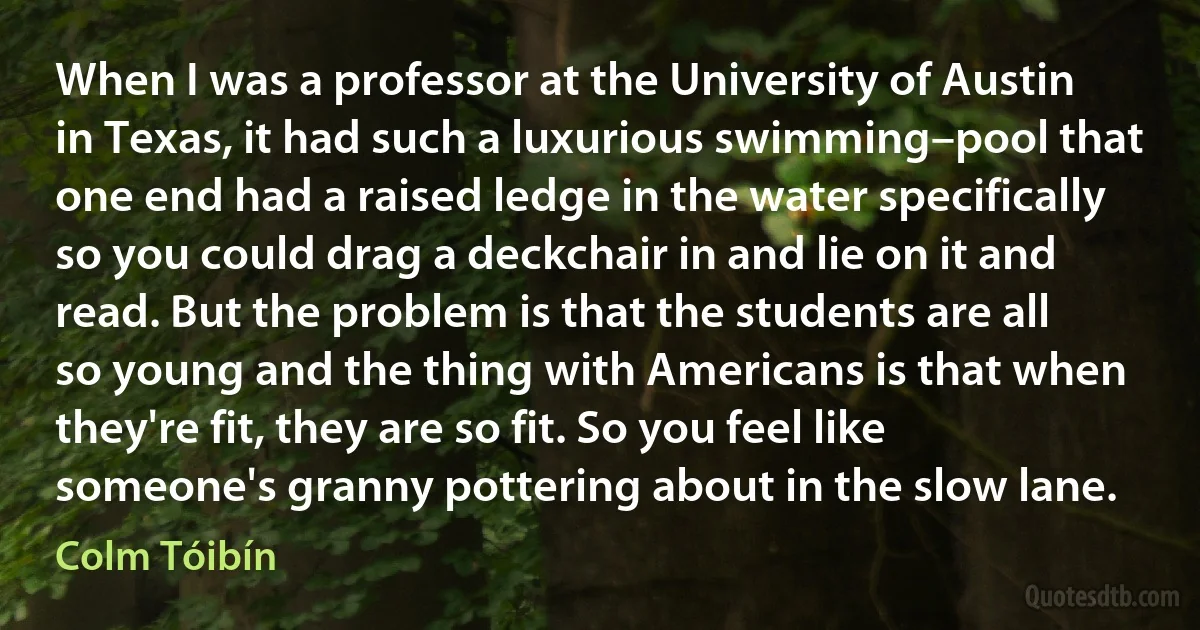Slow Quotes - page 22
At the same time, new difficulties are constantly surfacing: experiences of failure and the human weaknesses which bring so much pain. We all know from experience that sometimes a task does not bring the satisfaction we seek, results are few and changes are slow, and we are tempted to grow weary. Yet lowering our arms momentarily out of weariness is not the same as lowering them for good, overcome by chronic discontent and by a listlessness that parches the soul. It also happens that our hearts can tire of the struggle because in the end we are caught up in ourselves, in a careerism which thirsts for recognition, applause, rewards and status. In this case we do not lower our arms, but we no longer grasp what we seek, the resurrection is not there. In cases like these, the Gospel, the most beautiful message that this world can offer, is buried under a pile of excuses.

Pope Francis
It is difficult to make a general judgement about genetic modification (GM), whether vegetable or animal, medical or agricultural, since these vary greatly among themselves and call for specific considerations. The risks involved are not always due to the techniques used, but rather to their improper or excessive application. Genetic mutations, in fact, have often been, and continue to be, caused by nature itself. Nor are mutations caused by human intervention a modern phenomenon. The domestication of animals, the crossbreeding of species and other older and universally accepted practices can be mentioned as examples. We need but recall that scientific developments in GM cereals began with the observation of natural bacteria which spontaneously modified plant genomes. In nature, however, this process is slow and cannot be compared to the fast pace induced by contemporary technological advances, even when the latter build upon several centuries of scientific progress.

Pope Francis
Progress in modifying our concept of control has been and will be comparatively slow. In the first place, it requires the application of certain modern physical concepts; and in the second place it requires the application of statistical methods which up to the present time have been for the most part left undisturbed in the journal in which they appeared.

Walter A. Shewhart
Looking at the Temple and the Courts and the mountain road that winds below, we see this picture of human evolution, and the track along which the race is treading, and the Temple that is its goal... along that road round the mountain stands a vast mass of human beings, climbing indeed, but climbing so slowly, rising step after step; sometimes it seems as though for every step forward there is a step backward, and though the trend of the whole mass is upwards it mounts so slowly that the pace is scarcely perceptible. And this aeonian evolution of the race, climbing ever upwards, seems so slow and weary and painful that one wonders how the pilgrims have the heart to climb so long...

Annie Besant
Looking at them, it does not seem as though even progress in intellect, slow as that also is, made the pace very much more rapid. When we look at those whose intellect is scarcely developed, they seem after each day of life to sink to sleep almost on the place they occupied the day before; and when we glance over those who are more highly evolved so far as intellect is concerned, they too are travelling very very slowly, and seem to make small progress in each day of life.

Annie Besant
This option the consumer retains of being able to buy security wherever he pleases brings about a constant emulation among all the producers, each producer striving to maintain or augment his clientele with the attraction of cheapness or of faster, more complete and better justice.If, on the contrary, the consumer is not free to buy security wherever he pleases, you forthwith see open up a large profession dedicated to arbitrariness and bad management. Justice becomes slow and costly, the police vexatious, individual liberty is no longer respected, the price of security is abusively inflated and inequitably apportioned, according to the power and influence of this or that class of consumers. The protectors engage in bitter struggles to wrest customers from one another. In a word, all the abuses inherent in monopoly or in communism crop up.

Gustave de Molinari
Why should we fear that which will come to all that is?
We cannot tell, we do not know, which is the greater blessing - life or death. We do not know whether the grave is the end of this life, or the door of another, or whether the night here is not somewhere else at dawn. Neither can we tell which is the more fortunate - the child dying in its mother's arms, before its lips have learned to form a word, or he who journeys all the length of life's uneven road, painfully taking the last slow steps with staff and crutch.

Robert G. Ingersoll
But what would become of mass production and its system of financial expansion if technical perfection, durability, social efficiency, and human satisfaction were the guiding aims. The very conditions for current financial success - constantly expanding production and replacement - works against these ends. To ensure the rapid absorption of its immense productivity, megatechnics resorts to a score of different devices: consumer credit, installment buying, multiple packaging, non-functional designs, meretricious novelties, shoddy materials, defective workmanship, built-in fragility, or forced obsolescence through frequent arbitrary changes of fashion. Without constant enticement and inveiglement by advertising, production would slow down and level off to normal replacement demand. Otherwise many products could reach a plateau of efficient design which would call for only minimal changes from year to year.

Lewis Mumford
In my account of his [Lamarck's] theory, I did not, at the time, fully appreciate the deep conviction which it displays of the slow manner in which geological changes have taken place, and the insignificance of thirty or forty centuries in the history of a species, and that, too, at a period when very narrow views were entertained of the extent of past time by most of the ablest geologists, and when great revolutions of the earth's crust, and its inhabitants, were generally attributed to sudden and violent catastrophes.

Charles Lyell
I've seen anti-Semitism essentially disappear in my adult life as a social and economic factor. There may be some nuts out there, but generally things are fine. I think the same thing will happen with gayness. We'll get to a point soon enough where it's not even an issue anymore. But progress can be slow. I filed my first gay rights bills in 1972 in Massachusetts. Forty years later, it would be nice to have this wrapped up and put to bed.

Barney Frank
I suppose I've been knocking on heaven's door for about 11 years now, with one sort of high or another. The only kinds of drugs I use, though, are ones that keep me working for longer periods of time. I haven't gotten involved in anything heavy since '68. I had a silly flirtation with smack then, but it was only for the mystery and enigma of trying it. I never really enjoyed it at all. I like fast drugs. I've said that many times. I hate falling out, where I can't stand up and stuff. It seems like such a waste of time. I hate downs and slow drugs like grass. I hate sleep. I would much prefer staying up, just working, all the time. It makes me so mad that we can't do anything about sleep or the common cold.

David Bowie



